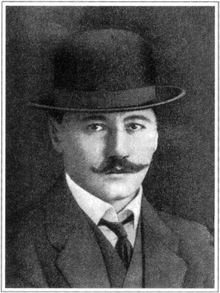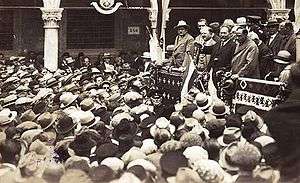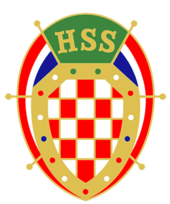Croatian Peasant Party
The Croatian Peasant Party (Croatian: Hrvatska seljačka stranka, HSS) is an agrarian[3] political party in Croatia founded on December 22, 1904 by Antun and Stjepan Radić as Croatian Peoples' Peasant Party (HPSS). The Brothers Radić believed that the realization of Croatian statehood was possible within Austria-Hungary, but that it had to be reformed as a Monarchy divided into three equal parts – Austria, Hungary, Croatia. After the creation of Kingdom of Yugoslavia in 1918, Party requested for the Croatian part of the Kingdom to be based on self-determination. This brought them great public support which columned in 1920 parliamentary election when HPSS won all 58 seats assigned to Croatia.
Croatian Peasant Party Hrvatska seljačka stranka | |
|---|---|
 | |
| President | Krešo Beljak |
| Founder | Stjepan Radić |
| Founded | 22 December 1904 (historical party) 15 December 1989 (modern party)[1] |
| Headquarters | Zagreb |
| Ideology | Historical: |
| Political position | Centre[2][8] to centre-left[9] |
| National affiliation | Restart Coalition (since 2016) |
| International affiliation | International Peasants' Union (1921–1988) Peasant International (1924–1925) |
| Colours | Green |
| Slogan | Faith in God and Peasant Unity |
| Anthem | "Famous Son of the Croatian People" |
| Sabor | 2 / 151 |
| European Parliament | 0 / 12 |
| County Prefects | 0 / 21 |
| Mayors | 4 / 128 |
| Party flag | |
 | |
| Website | |
| hss | |
In 1920, disgruntled with a bad position of Croats in the Kingdom, the party changed its name into Croatian Republican Peasant Party (HRSS) and started advocating secession from the Kingdom and the establishment of "peaceful peasant Republic of Croatia". On 1923 and 1925 election, HRSS doubled the number of won votes, and has thus become the second largest party in the Parliament.
In 1927, faced with a constant prosecution by the regime, HRSS was forced to soften its policy, change its name into Croatian Peasant Party (HSS), recognize the Vidovdan Constitution and form a coalition with Serbian People's Radical Party. This resulted in HSS losing its popularity which was seen in 1927 election when it lost almost third of votes won in the previous elections. After termination of the coalition agreement with the Radicals, HSS formed Peasant-Democratic Coalition with Pribičević's Independent Democratic Party. In 1928, Vladko Maček become the new president of HSS after the assassination of Stjepan Radić.
After King Alexander declared dictatorship in 1929, HSS was banned and its members prosecuted. HSS participated in the 1935 and 1938 election as a part of the United opposition coalition which helped it to regain its influence. In 1939, Cvetković–Maček Agreement helped in the establishing of the HSS-governed Banovina of Croatia. After the establishment of Nazi-puppet state, the so-called Independent State of Croatia (NDH) in 1941, HSS was banned once again, with half of its members joining either Ustaše or Partisans, and part staying loyal to Maček who believed that the victory of Allies would bring liberal democracy into Croatia and that HSS would return to power. In May 1945, Maček left the country, while HSS split into two fractions which boycotted the 1945 election because of their opposition to the Communists. During the period of SFR Yugoslavia (1945–1991), HSS was active abroad.
On May 25, 1991, HSS was restored under the leadership of Drago Stipac at the so-called Assembly of Unification. The party first entered Government after 2000 elections, on which it participated as part of liberal coalition (HSS-IDS-HNS-LS-SDA), with Ivica Račan (SDP) serving as Prime Minister and its president Zlatko Tomčić as Parliament Speaker. After HSS lost 2003 election, it moved to the opposition. In 2007 election, HSS formed yet another liberal coalition (HSLS-PGS-ZDS-ZS) and eventually ended up leading Ministries of Tourism and Agriculture in the Cabinet of Ivo Sanader II, and Ministries of Tourism and Regional Development in the Cabinet of Jadranka Kosor. In 2011 election party won only 1 seat in the Parliament as has moved to the opposition. In 2015 election HSS won 1 seats as part of the conservative Patriotic Coalition, and supported Tihomir Orešković as Prime Minister. In 2016 election, HSS won 5 seats as part of the liberal People's Coalition.
History
Austria-Hungary
The Croatian People's Peasant Party (Hrvatska pučka seljačka stranka) was formed on December 22, 1904 by Antun Radić along with his brother Stjepan Radić. It participated in the elections for the first time in the Kingdom of Croatia-Slavonia in 1906, winning no seats. Despite this, they entered the parliament in subsequent elections. In 1908 the party won three seats, in 1910 nine seats, and in 1911 eight seats. While Croatia was still part of Austria-Hungary, HSS sought for greater autonomy, peasants' rights and land reform.
Kingdom of Yugoslavia
After World War I and the dissolution of Austria-Hungary, the HSS garnered significant popular and electoral support for its advocacy of an independent Croatian state, and its opposition to the creation of the Kingdom of Serbs, Croats and Slovenes (which actually meant joining together the State of Slovenes, Croats and Serbs with the Kingdom of Serbia) which the party claimed would be dominated by Serbs.
 | .jpg) |
| Antun Radić | Stjepan Radić |
Despite the party's efforts, the kingdom was established, and the HSS became an opposition party in parliament. Although popular among its constituency, the party's weakness was its limited national appeal and its ethnic and economic-based constituency.
The HSS advocated a federal state in which Croatia would be afforded equal status vis-à-vis Serbia, and the party platform still called for greater Croatian autonomy and eventually independence. With that goal in mind, the HSS renamed itself the Croatian Republican Peasant Party until the royal authorities forced the party to remove the word "Republican" in 1925 because of its anti-royalist connotation.

In the early 1920s the Yugoslav government of prime minister Nikola Pašić used political and police pressure over voters and ethnic minorities, confiscation of opposition pamphlets[11] and other measures of election rigging to keep the opposition, mainly the Croatian Peasant Party and its allies, in minority in Yugoslav parliament.[12] Pasic believed that Yugoslavia should be as centralized as possible, creating in place of distinct regional governments and identities a Greater Serbian national concept of concentrated power in the hands of Belgrade.[13]
As the opposition, the party's strategy was to boycott parliamentary sessions which not only allowed Serb politicians to further consolidate power, it also created political instability and hostility. On June 20, 1928, Puniša Račić, a Serbian ultra-nationalist, was offended by a comment made by HSS deputies during a parliamentary session, shot and mortally wounded Radić and several other HSS deputies on the chamber floor. King Alexander subsequently proclaimed a royal dictatorship on January 6, 1929. Soon after the country was renamed the Kingdom of Yugoslavia and all political parties were banned.
Some political freedoms were restored in 1931 and the HSS, led by Vladko Maček, once again was in opposition. Maček showed great organisational abilities and political skill, which resulted in HSS gathering support from all classes of Croatian people, as well from followers of almost any ideology. HSS also became umbrella for almost all opposition party in Kingdom of Yugoslavia. Although HSS-led coalition lost 1938 elections, it remained force to be reckoned with and in August 1939 Cvetković-Maček agreement led to creation of semi-autonomous Banovina of Croatia under HSS rule. At the same time, HSS returned to royal government. Ivan Šubašić of the HSS became head of the Banovina as ban. In the 1940 local elections, HSS independently or in a coalition won a total of 564 out of 625 municipalities where elections were held.
Electoral performances
| Year | Popular vote | % of popular vote | Coalition | Seats won | Seat change | Government |
|---|---|---|---|---|---|---|
| November 1920 | 230,590 | 14.3% | — | 50 / 315 |
opposition | |
| March 1923 | 473,733 | 21.9% | — | 70 / 315 |
opposition | |
| February 1925 | 545,466 | 22.2% | — | 67 / 315 |
government | |
| September 1927 | 367,570 | 15.8% | — | 61 / 315 |
opposition | |
| November 1931 | banned | — | 0 / 370 |
no seats | ||
| May 1935 | 1,076,345 | 37.4% | United Opposition | 67 / 370 |
opposition | |
| December 1938 | 1,364,524 | 44.9% | United Opposition | 67 / 373 |
government | |
World War II and afterwards
The party's fortunes declined precipitously with the outbreak of World War II and the German invasion in April 1941. Some party members were divided among those who sympathized with the Croatian fascist Ustasha independence movement, and those whose left-leaning beliefs led them to join the Partisans. But the vast majority of HSS supporters remained passive and neutral for the duration of the war as the Ustasha, the communist Partisans and the royalist Chetniks fought for control.
After the communist victory, the Communist Party of Yugoslavia established one-party rule — the HSS, along with other political parties were declared illegal. In 1947, HSS joined the International Peasants' Union. Maček represented the HSS in exile until his death in 1964. Juraj Krnjević took over as leader until his own death 1988, only a year before the HSS could resume its work within Croatia.
Modern party

With the advent of multi-party system in 1990, the HSS was reconstituted and on the 1990 election won several seats in the Croatian Parliament. They remained in opposition until the 2000 elections when they received three ministerial portfolios as part of their participation in the winning Social Democratic Party of Croatia-led coalition.
On elections 2000 HSS led center coalition alongside IDS-HNS-LS and Coalition won 25 seats in parliament with 17 seats for HSS (16 domestic and one minority seat). After the elections HSS formed coalition with SDP and had three ministers in government (education, agriculture and entrepreneurship), vice president of government and Speaker of Croatian Parliament, Zlatko Tomčić.
On local elections 2001. HSS achieved its best results ever and won 8 out of 21 county prefects (župan) and lot of municipalities and towns and became party which was second in number of local elected officials.
Today, the HSS considers itself among other center European political parties that advocate pro-agrarian policies and greater economic interventionism by the state. On social matters the HSS is largely conservative, supporting a Christian-based morality in public life. HSS is an associate member of the European People's Party (EPP).
At the elections in November 2003, the party won 7.2% of the popular vote and 10 out of 151 seats (nine domestic seats and one minority seat).
Before the 2007 parliamentary elections, HSS announced a coalition with opposition parties Alliance of Primorje-Gorski Kotar and Croatian Social Liberal Party. The coalition received 6.5% of the popular vote and 8 out of 153 seats (six for HSS itself). After elections they became part of Ivo Sanader's governing coalition and received two ministerial portfolios (regional development and tourism), vicepresident of government and vicepresident of Parliament.
On 2011 parliamentary elections party score worst result in party's history receiving only one parliamentary seat and 3% of popular vote.
Party convention 28 January 2012 elected Branko Hrg as new president.
In 2014 Croatian Peasant Party in coalition with Croatian Democratic Union won one seat in European Parliament – Marijana Petir. However, on June 6, 2017, Petir was expelled from Croatian Peasant Party, which left the party without seats in European Parliament.[14]
Election history
Parliamentary
The following is a summary of HSS's results in parliamentary elections for the Croatian parliament. The "Total votes" and "Percentage" columns include sums of votes won by pre-election coalitions HSS had been part of. After preferential votes were introduced into the electoral system, the total votes column includes the statistic of the sum of votes given to HSS candidates on the coalition lists. The "Total seats" column includes sums of seats won by HSS in election constituencies plus representatives of ethnic minorities affiliated with HSS.
| Election | In coalition with | Votes won (Coalition totals) | Percentage | Total seats won (HSS only) | Change | Government |
|---|---|---|---|---|---|---|
| August 1992 | None | 111,869 | 4.25 | 3 / 138 |
Opposition | |
| October 1995 | HNS-IDS–HKDU–SBHS | 441,390 | 18.26 | 10 / 127 |
Opposition | |
| January 2000 | HNS–IDS–LS–ASH | 432,527 | 14.70 | 17 / 151 |
Government | |
| November 2003 | None | 177,359 | 7.20 | 10 / 151 |
Opposition | |
| November 2007 | HSLS-PGS | 161,814 | 6.50 | 6 / 153 |
Government | |
| December 2011 | None | 71,450 | 3.00 | 1 / 151 |
Opposition | |
| November 2015 | Patriotic Coalition | 744,507 (23,423[15]) | 33.46 | 1 / 151 |
Government support | |
| September 2016 | People's Coalition | 636,602 (33,514) |
33.82 | 5 / 151 |
Opposition | |
| July 2020 | Restart Coalition | 414,615 | 24.87 | 2 / 151 |
Presidential
The following is a list of presidential candidates who were endorsed by HSS.
| Election year(s) | Candidate | 1st round | 2nd round | Result | ||
|---|---|---|---|---|---|---|
| # of overall votes | % of overall votes | # of overall votes | % of overall votes | |||
| 2000 | Stjepan Mesić (HNS) | 1.100.671 | 41.3 (#1) | 1.433.372 | 56.01 (#1) | Won |
| 2005 | Stjepan Mesić (Ind.) | 1.089.398 | 48.92 (#1) | 1.454.451 | 65.93 (#1) | Won |
| 2009-10 | None | |||||
| 2014–15 | Kolinda Grabar-Kitarović (HDZ) | 665.379 | 37.22 (#2) | 1.114.945 | 50.74 (#1) | Won |
| 2019–20 | Zoran Milanović (SDP) | 562,783 | 29.55 (#1) | 1,034,170 | 52.66 (#1) | Won |
European Parliament
| Election | In coalition with | Votes won (Coalition totals) | Percentage | Total seats won (HSS only) | Change |
|---|---|---|---|---|---|
| April 2013 | HSLS | 28,646 | 3.86 | 0 / 12 |
|
| May 2014 | HDZ–HSP-AS | 381,844 | 41.4 | 1 / 11 |
|
| May 2019 | Amsterdam Coalition | 55,806 | 5.19% | 0 / 12 |
Party presidents
- Stjepan Radić (1904–1928)
- Vladko Maček (1928–1964)
- Juraj Krnjević (1964–1988)
- Josip Torbar (1988–1991)
- Drago Stipac (1991–1994)
- Zlatko Tomčić (1994–2005)
- Josip Friščić (2005–2012)
- Branko Hrg (2012–2016)
- Krešo Beljak (2016–)
See also
- Croatian Peasant Party (Bosnia and Herzegovina)
- Slovene Peasant Party
References
- "Hrvatska seljačka stranka - HSS". digured.srce.hr (in Croatian). Retrieved 2017-06-08.
- Nordsieck, Wolfram (2020). "Croatia". Parties and Elections in Europe.
- Gladoic, Andrea. "Croatia's Largest Political Parties". Expat in Croatia. Retrieved 12 October 2018.
- https://www.antenazadar.hr/clanak/2019/02/homoseksualcima-onemogucili-udomljavanje-djece-glasovac-zakon-je-nelogican-saljemo-ga-na-ustavni-sud/
- "RADIKALNI POLITIČKI ZAOKRET BELJAKOVOG HSS-a, STRANKA IMA NOVU STRATEGIJU 'Zbogom demokršćanstvu, mi smo progresivni liberali'".
- "HSS u programu napravio nagli zaokret: 'Više nismo konzervativni, sad smo zeleni i progresivni'".
- Nordsieck, Wolfram (2016). "Croatia". Parties and Elections in Europe. Archived from the original on 27 March 2019.
- "Key Political Parties in Croatia". Balkan Insight. 27 September 2010.
- https://vijesti.rtl.hr/novosti/hrvatska/3336687/sef-hss-a-nakon-usvajanja-novo-statuta-stranke-siguran-sam-da-mozemo-napraviti-pozitivno-iznenadjenje-na-izborima/
- "U Kolanu otvorena izložba povodom obilježavanja 110. obljetnice HSS-a". Archived from the original on 2018-06-13. Retrieved 2018-06-13.
- Balkan Politics, TIME Magazine, March 31, 1923
- Elections, TIME Magazine, February 23, 1925
- The Opposition, TIME Magazine, April 06, 1925
- "Marijana Petir izbačena iz HSS-a". Index.hr (in Croatian). 6 June 2016.
- Suzana Barilar (13 November 2015). "Preferencijalni glasovi". Jutarnji list (in Croatian).
Bibliography
- Stallaerts, Robert (2010). Historical dictionary of Croatia. Scarecrow Press. ISBN 0-271-01810-0.CS1 maint: ref=harv (link)
- Petrić, Hrvoje (2015). "O braći Radić i počecima Hrvatske pučke seljačke stranke" [About Radić brothers and the beginnings of the Croatian People's Peasant Party]. 110 godina Hrvatske seljačke stranke. Matica hrvatska. pp. 539–606. ISBN 978-953-341-064-7.CS1 maint: ref=harv (link)
- Dragnich, Alex N. (1983). The First Yugoslavia: Search for a Viable Political System. Hoover Press. ISBN 978-0-8179-7843-3.CS1 maint: ref=harv (link)
External links
- Official website
